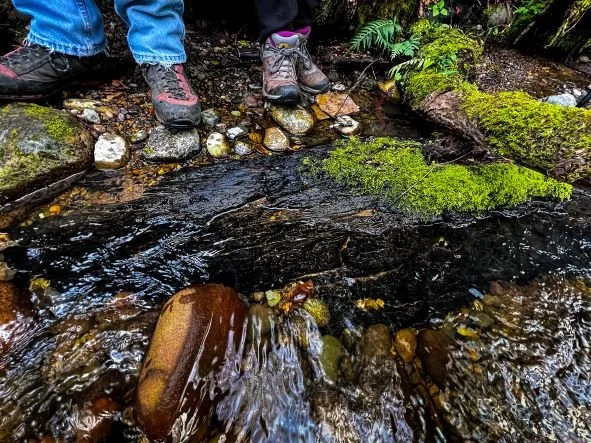IATC Submits Public Comment on New Forest Buffer Rules
Cougar Mountain stream
This summer, the Washington State Forest Practices Board proposed wider tree buffers—50 to 75 feet—along non-fish-bearing perennial streams in Western Washington to reduce stream warming and protect water quality. Though the rule covers less than 3% of forestland under the state’s Habitat Conservation Plan, it promises meaningful ecological benefits while maintaining flexibility for landowners. Both a cost-benefit analysis and a Department of Ecology review support the rule’s positive impact on water quality.
Aligned with our mission to protect our public lands, the Issaquah Alps Trails Club submitted public comment in support of the rule and urged strong implementation. Next, Ecology will review comments, finalize its Tier II Antidegradation Analysis, and submit it to the Forest Practices Board before their November 12, 2025 meeting, where next steps will be decided.
Learn more and follow the process on the Department of Ecology's website.
Read our full comment below.
August 18, 2025
Forest Practices Board
Watershed Management Section
Department of Ecology
PO Box 47696
Olympia, WA 98504-7696
Dear Members of the Forest Practices Board,
The Issaquah Alps Trails Club respectfully submits this letter in strong support of the proposed rule to require riparian buffers around non-fish bearing perennial streams on privately owned, logged lands. This rule would provide additional and necessary protections for fish and other wildlife downstream by keeping tributary streams cooler and clearer of erosion, bringing rules for logging on private land into greater alignment with existing rules for logging on public lands.
Specifically, this rule would significantly benefit local riparian ecosystems and improve salmon habitat. We know that two of the greatest threats to stream ecosystems, and the fish and wildlife within them, are excessive sediments from erosion and high-water temperatures. Salmon, in particular, need cool, clear streams to survive their early stages of life. Ecology’s Draft Tier II Antidegradation Analysis confirms that adding buffer requirements to privately owned working forests would reduce both water temperature and erosion. There are existing protections for fish-bearing streams, but not their non-fish-bearing tributaries, which are just as important to protect if downstream ecosystems are to thrive. All of our local ecosystems are deeply connected and preventing warm water and sediment from excessive and unnecessary erosion at the source, including in non-fish bearing perennial streams, is essential to ensuring the health of the entire ecosystem.
We encourage the Forest Practices Board to adopt rules that require private landowners to improve forest practices in a way that more closely aligns with the Washington Department of Natural Resources’ (DNR) Habitat Conservation Plan (HCP). The DNR adopted its HCP in 2006, committing itself to restore and maintain our riparian habitats for the benefit of fish, other aquatic species, and water quality, while keeping the State’s robust timber industry viable. The HCP outlines rules for logging on public lands to meet these goals; however, it fails to regulate privately owned lands, which also contribute to the overall health of our ecosystems. The Washington Department of Ecology’s Watershed Health Monitoring Project, which tracks the status of Washington's rivers and streams, shows there is still significant work to be done to improve our State’s stream conditions. Adopting additional rules that are within the HCP for privately owned lands, such as increased riparian buffers and critical area buffers, will further protect critical habitat across the state.
Simply put, adopting the Forest Practices Board’s new rule is not only essential for ensuring the health of entire watersheds, but also long overdue as the rest of the State, including the Department of Natural Resources, has adopted such regulations. We are excited to see this important rule be adopted and are hopeful that additional future regulations will be considered to continue to improve the health of some of our most important habitats.
Thank you for the opportunity to provide this comment.
Sincerely,
Kim Ngo, Executive Director
exec@issaquahalps.org

